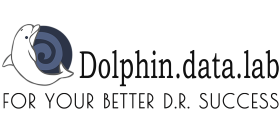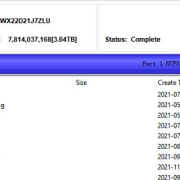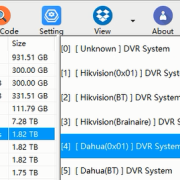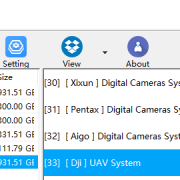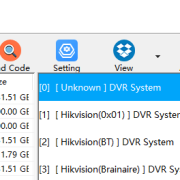This is one very successful Western Digital SMR hard drive firmware repair and data recovery case study for one Dolphin user in India.
WD SMR Patient hdd id:
Model number-WD40EZAZ-00SF3B0
PCB number: 810011
WD SMR Patient hdd Failure symptoms:
Spin up and down and not possible to access data area
Firmware repair tools and data recovery tools used in this case study:
DFL-SRP for WD firmware repair tool
DFL-DDP data recovery equipment
WD SMR Patient hdd firmware repair and data recovery steps:
01: Backup up original WD SMR Patient hdd ROM by ROM chip pin reader;
02: Generate unlock rom by DFL-SRP for WD firmware repair tool;
03: Write unlock ROM to original 810011 PCB;
04: Connect PCB only, enter DFL-WD firmware repair software by kernel mode and then disable 411;
05: Install the PCB to patient HDD and backup key firmware modules, specially module 190;
06: Repair module 190(unique 190 repair assistant);
07: Fix SMR slow issue;
08: Auto load 190 to ram within DFL-DDP data recovery tool disk image setting;
09: Access to data area and all lost partitions and folders were available for immediate easy data recovery.
Any question is welcome to [email protected] or add Dolphin Skype ID: dolphin.data.lab
This is one 8TB WD82PURX-78GVLY0 DaHua DVR hard drive and the user couldn’t access this DVR drive in their DVR device and all videos were lost.
To recover all the lost valuable videos from this Western Digital helium DVR hard drives, the user selected Dolphin DVR data recovery software to recover the lost videos.
The user mount the DVR drive by DFL-SRP data recovery hardware to PC and the Dolphin DVR data recovery software detected the DVR drive and listed it, the user extended all the lost 4 partitions and recovered all the lost videos. Please note the user needs to select the partition one by one to recover.
Video Guide: WD82PURX 78GVLY0 DaHua DVR HDD Data Recovery Steps
Any question is welcome to [email protected] or add Dolphin Skype ID: dolphin.data.lab
At Dolphin Data Lab, we pride ourselves on being a leading provider of professional data recovery tools and training. This week, we are excited to host a customer from Kenya for an intensive five-day comprehensive training session.
Focused Data Recovery Training Modules
The training program is designed to cover crucial aspects of data recovery, with a primary focus on:
- Hard drive, flash drive and SSD data recovery possibilities: Understanding the initial steps to identify issues with hard drives, USB flash drives, M2 SATA, NVME, U2 NVME, etc;
- HDD Firmware Repair: Techniques to fix firmware-related problems that hinder data access;
- Identifying Head/PCB Donors: Learning how to find suitable donor parts for damaged drives;
- Head and Platter Swap Tips: Hands-on experience in swapping heads and platters to recover data from severely damaged drives.
Comprehensive Brand Coverage
Our training spans all major hard drive brands, ensuring a well-rounded understanding and capability in handling various drives. The brands covered include:
- Seagate
- Western Digital (WD)
- Hitachi/IBM
- Toshiba/Fujitsu
- Samsung
Specialized Topics
In addition to the general modules, our expert engineer provided in-depth sessions on specialized topics, including:
- Recovering Data from New Seagate Rosewood Drives: Techniques and tools required for the latest Seagate models;
- Recovering Data from WD SMR Drives: Strategies to deal with Shingled Magnetic Recording (SMR) technology;
- Repairing Bad Module 190: Detailed steps to fix common issues associated with module 190;
- Hex analysis and some special data recovery tips by hex modification;
- Firmware module analysis to see how different module works and how to repair the firmware modules.
Hands-On Experience
We believe that practical experience is essential for mastering data recovery. Therefore, our training sessions are heavily focused on hands-on practice. Our Kenyan customer actively participated in every step, applying the knowledge and techniques learned to real drives. This approach ensures that the customer can confidently perform data recovery and drive repairs independently.
A Commitment to Excellence
At Dolphin Data Lab, we are committed to providing top-notch training that empowers our customers with the skills and confidence needed for successful data recovery. By offering tailored, hands-on training sessions, we help our clients become proficient in using our advanced tools and techniques.
We are proud to support our global customer base and look forward to continuing to share our expertise with data recovery professionals around the world.
Any question is welcome to [email protected] or add Dolphin Skype ID: dolphin.data.lab
How to recover deleted videos from DJI Drones?
Dolphin DVR helps to recover lost videos from different Drone DJI models. The lost videos can be caused by accidental deletion, format or device initialization.
The following are the supported DJI models:
DJI Phantom 4
DJI P3X
DJI P3XW
DJI P4
DJI Lingmo Packet 2
DJI Avata
DJI Air2s Short
DJI Air2s Long
DJI Mavic 2 Pro
DJI Mavic 3
DJI Mavic 3 Pro
DJI OsmoAction3
DJI OsmoAction4
Other DJI Models are also supported for lost video data recovery.
Steps to recover lost videos from DJI drones/UAV
01: Select the DJI drone video storage SD card or image file;
02: Select the DJI UAV system, models or unknown models;
03: Select video file type-MP4, MOV, 3GP, AVI;
04: Select video code type: H263, H264 or H265 and the Dolphin DVR software will start to recover lost videos from DJI Drones automatically.
Any question is welcome to [email protected] or add Dolphin Skype ID: dolphin.data.lab
Please be kindly informed that Dolphin Data Lab Headquarter will be closed for traditional Dragon Boat Festival holiday from June 8 to June 10. And resume to office on Tuesday, June 11 2024.
During this 3 day holiday, product delivery service and remote technical support service are not available, but will be handed right after holiday. Sorry for inconvenience caused.
Thank you for your attention.
About Dragon Boat Festival
The Dragon Boat Festival is a popular event in China, also it is a national holiday. It takes place on the fifth day of fifth month of the Chinese lunar calendar. This year it falls on June 10, Monday.
This celebration has been in existence for over 2000 years. What do people do to celebrate this Festival? We usually eat rice dumplings, drink realgar wine, and race dragon boats. Other activities includes hanging mugwort and calamus, taking long walks, writing spells and wearing perfumed medicine bags.
Dragon boat racing is the most popular part of this Festival. Boats are decorated to look like dragons. They can be up to 65 feet long. They can hold up to 22 people. Paddlers in the boat race train to paddle very quickly. They also train to paddle in sync with other team members. The team who wins the race believes they will receive good luck.
Happy Holiday, wish all Dolphin users good luck in 2024!
Dolphin DVR V3.8.3, new CCTV, NVR, DVR, HVR, Digital Camera, Video recorders data recovery software is available for Dolphin users worldwide.
Software upgrade date: 2024-05-31
The following are the new features of Dolphin DVR V3.83:
Raw scan video recovery for unknown DVR is added;
Partition starting address auto detection is added, this one is very powerful for DVR drives suffering device initialization or format;
Other DVR software cannot find any videos back but Dolphin DVR does.
DJI Mavic3Pro h264 h265 professional fragmented video recovery and carving algorithm has been added;
DJI OsmoAction4 h265 professional fragmented video recovery and carving algorithm has been added;
HIKSEMI RAID BT FS professional fragmented video recovery and carving algorithm has been improved;
XinShiAn WJA FS professional fragmented video recovery and carving algorithm has been added;
XingShiJu DVR professional fragmented video recovery and carving algorithm has been added;
TAIWAN SECOM DVR professional fragmented video recovery and carving algorithm has been added;
ZECN Body-Worn Cameras h264 professional fragmented video recovery and carving algorithm has been added;
BYD SONG car driving recorder h264 professional fragmented video recovery and carving algorithm has been added;
Panasonic DC-S5M2 h264 professional fragmented video recovery and carving algorithm has been added;
Canon PowerShot SX220 HS H264 professional fragmented video recovery and carving algorithm has been added;
JVC GY-HM200 H264 professional fragmented video recovery and carving algorithm has been added;
Nikon COOLPIX W300 h264 professional fragmented video recovery and carving algorithm has been added;
Nikon COOLPIX P510 h264 professional fragmented video recovery and carving algorithm has been added;
Nikon COOLPIX P3 jpeg professional fragmented video recovery and carving algorithm has been added;
Nikon COOLPIX S6300 h264 professional fragmented video recovery and carving algorithm has been added;
Nikon Z 30 h264 professional fragmented video recovery and carving algorithm has been added;
Nikon Z9 h265 professional fragmented video recovery and carving algorithm has been added;
Panasonic DC-S5M2X h265 professional fragmented video recovery and carving algorithm has been added;
Canon EOS 200D II H264 professional fragmented video recovery and carving algorithm has been improved for best success rate;
Canon EOS R6m2 H264 professional fragmented video recovery and carving algorithm has been improved for best success rate;
Canon EOS R7 H264 professional fragmented video recovery and carving algorithm has been improved for best success rate;
Canon PowerShot G7 X Mark III H264 professional fragmented video recovery and carving algorithm has been improved for best success rate;
Gopro HERO4 Silver H264 professional fragmented video recovery and carving algorithm has been improved for best success rate;
Sony ILME-FX30 H264 professional fragmented video recovery and carving algorithm has been improved for best success rate;
Panasonic DC-GH5 h264 professional fragmented video recovery and carving algorithm has been improved for best success rate;
Panasonic DC-GH5S H264 professional fragmented video recovery and carving algorithm has been improved for best success rate;
Any question is welcome to [email protected] or add Dolphin Skype ID: dolphin.data.lab
